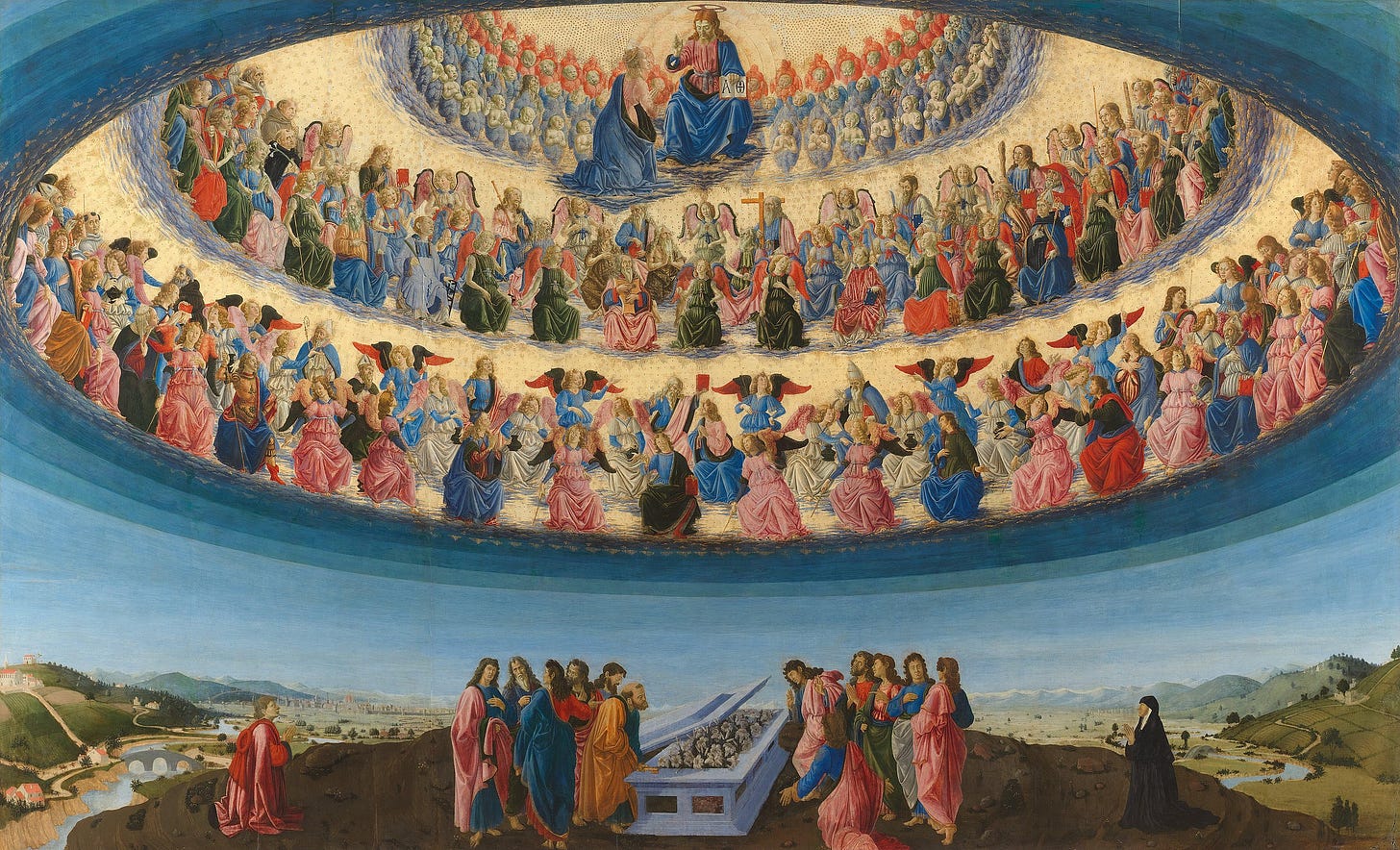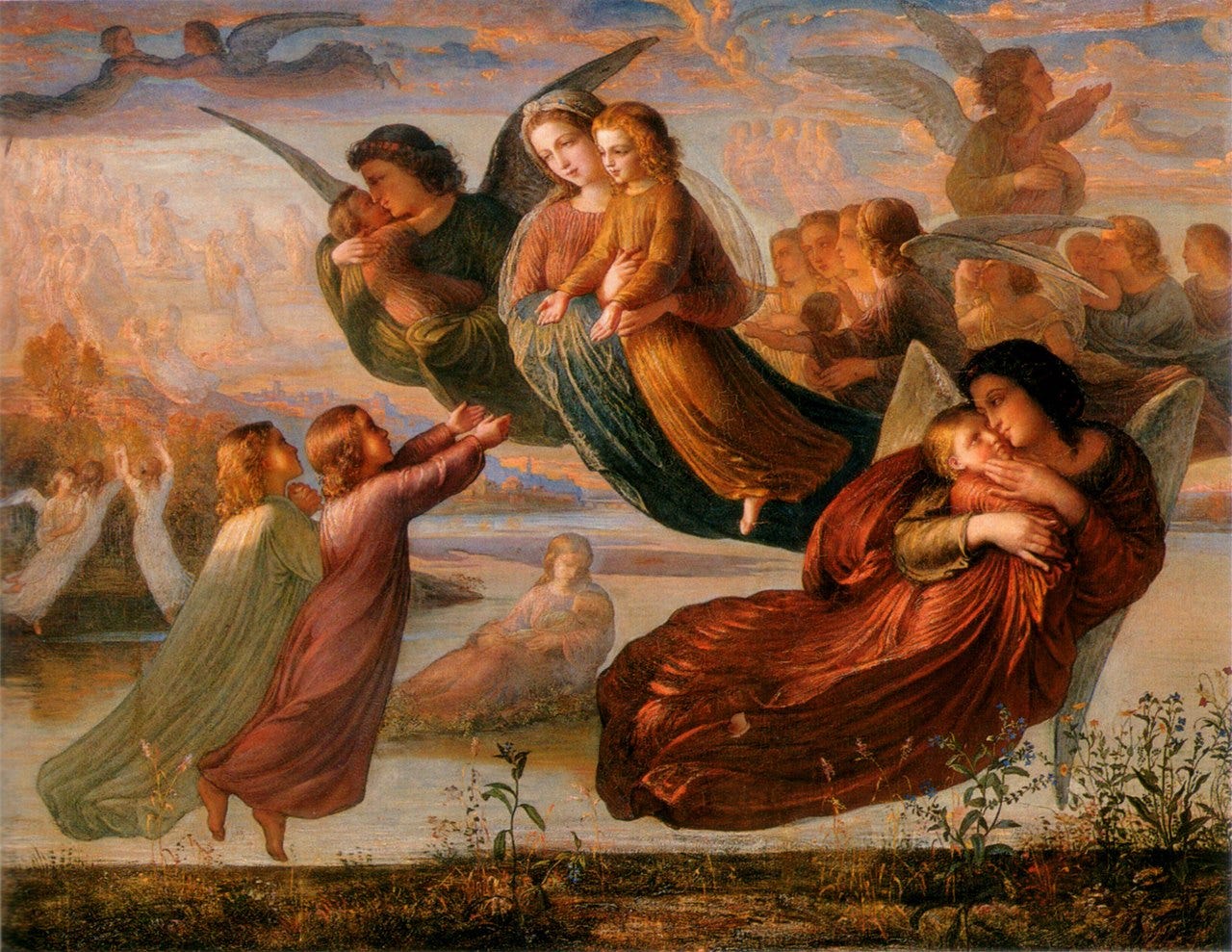A Child Singing with the Angels: The Non-Funerary Funeral
What riches we have lost — and must seek to regain!
In lieu of the usual Weekly Roundup, I am offering a meditation on the death of a baptized child as celebrated in the Roman Rite (and yes, I truly mean “celebrated,” for reasons that will become apparent). I have also made a recording of the article for those who like to listen. The Weekly Roundup will resume next week. Also, I must apologize for having sent out yesterday’s article under my own name; that was a simple oversight. It was written by regular T&S contributor John Mac Ghlionn (as the voiceover correctly stated). The misattribution has been corrected. —Dr. K
Today, my friend and collaborator Kennedy Hall, with his family, is saying farewell to the body of his son Gabriel, who was born on October 24 and lived for two hours. During that short time, he was baptized, confirmed, and greeted by his six siblings and his grandparents. Kennedy wrote on Substack: “He is now a saint in Heaven. Sweet Gabriel, please intercede for us so we may all reunite in a place where there are no more tears, and where we can praise God for all eternity.”
Kennedy and family, we promise you our prayers and condolences. Even knowing that Gabriel is in heaven does not make the death of a child any easier for mortal man, especially for parents. May Our Lady, who knew what it was to lose her child, obtain for you the deepest consolation and a renewed spirit of hope in the Lord that never disappoints.
This death, and the Hall family’s reaction to it, brought to mind one of the most beautiful customs in the traditional Roman Rite — a custom that the Halls themselves will take advantage of today.
In my old St. Andrew’s Daily Missal — or rather, my reprint of the 1945 edition, which I love both because of its superb commentaries, and because its calendar and Holy Week match up with the customs of an increasing number of traditional parishes nowadays — we find the following heading on p. 1821: “The Burial of Little Children.” The commentary reads:
When a baptized child dies before reaching the age of reason, it goes at once to heaven to praise God and enjoy Him with the angels. Wherefore the Gloria Patri of the Psalms is not replaced by the Requiem aeternam, and the Mass is the Votive Mass of the Angels, with white vestments and Gloria in excelsis, unless the rubrics prescribe the Mass of the day. If in the afternoon, Votive Vespers of the Angels may be sung.
I can’t remember when I first heard about this beautiful custom of not celebrating a Mass for the Dead or funeral Mass for such a little child, but rather a Mass of the Angels; it was probably a couple of decades ago by now. But since I had long been attending only university chapels and did not live near a traditional parish, no occasion like this had ever occurred. It remained theoretical knowledge.
In 2018, a little child died in the place where I was then living, and the rector of the nearby oratory of the Institute of Christ the King offered the Mass just as described above. I had the privilege of singing in the Choir. I found the experience extremely striking.
This custom bespeaks a resolutely and audaciously supernatural perspective: when all are mourning the loss of a citizen of earth, the Church rejoices in the gaining of a saint in heaven. The Introit of the Requiem Mass pleads: “Eternal rest grant unto them, O Lord, and may perpetual light shine upon them.” The Introit of the Mass of the Angels exults: “Bless the Lord all ye His angels: you that are mighty in strength, and execute His word, listening to the voice of His orders.” Then the verse challenges us with an imperative: “Bless the Lord, O my soul, and let all that is within me bless His holy name.” We are told to do the very thing the departed child is now doing, whose soul, with all that is within it, blesses the Lord.
Holy Mother Church bids us sing with and honor the angels, among whom is found the soul of this little child — a soul already mature in Christ through baptism and, it may be, confirmation, adorned with the full complement of infused virtues. The Epistle in the words of the Apocalypse brings before us the hosts of heaven, spirits and souls of the just, saying: “To Him that sitteth on the throne, and to the Lamb, benediction, and honor, and glory and power, for ever and ever.” There is no danger of hell for the baptized child, nor any deportation to the fires of purgatory; the gates of heaven are immediately flung open to receive this sinless, guiltless adopted son of God. This is why the interlectional chants proclaim: “Praise ye the Lord from the heavens: praise Him in the high places.… Alleluia, alleluia. I will sing praise to Thee in the sight of the angels: I will worship towards Thy holy temple, and I will give glory to Thy name. Alleluia.”

Just as, with apparently wild-eyed fanaticism (though in truth it is but the most sober right judgment) the Church, according to John Henry Newman, can say it were better for the entire universe to perish than that one sin be wilfully committed,1 so too, with a queenly confidence born of the mercies of the King, the Church, says the usus antiquior, deems it better, more truthful, more grateful, to don white vestments and sing alleluia for a Christian who dies before the age of reason than to put on black and utter the aweful words of the Dies Irae.2
The liturgical reform — monstrous in its rationalist leveling of every irregularity3 — could not tolerate this sharp distinction between the lightsome angelic Mass for the child saint and the dark Requiem Mass for the adult sinner. In its baffling dullness of heart, the reform was blind to both supernatural realities and natural ones.4 The sable grief that follows the dead man weighed down with years, the urgent reminder to pray for the repose of his soul, the supernatural glory that surrounds a babe of days snatched from this world and thus preserved from the scourge of sin, temptation, vice, anguish, and all the ills that cling to fallen human life—such horizons of life and faith were closed off to utilitarian brains.
The Montinian reform turned everything upside-down. It converted Requiems into informal beatifications, draped in the white of an Easter triumph presumed to be already gained, while suppressing the only instance where white vestments ought to be worn and alleluias and doxologies chanted, the only instance where heavenly glory may be joyfully, through a veil of tears, acknowledged as accomplished. The reform took away from the small child the Mass of the Angels that befitted it, and bestowed the honors of the altar on the old man to whom they were foreign, the one who needs earnest suffrages for pardon and salvation. Salva me, fons pietatis! It took away this magnificent testimony of faith in a victory known to be won by a few, and substituted a pseudo-victory vainly extended to all.
And why does the old liturgy exhort us, in the very presence of the child’s dead body, to praise the Lord — a sentiment that might seem out of place, to say the least? Here is where the eye of faith is more necessary than ever, to see what should be seen and not be clouded over by our frail flesh.
The one and only ultimate end of man is the beatific vision. If someone attains this, he has attained the purpose for which he was created and redeemed. If someone fails to attain this, he has failed as a human being and as a Christian. Our final condition is either total victory or total failure: we have gained all, or lost all. There is nothing in between. The only “happy ending” is heaven, and the only “tragedy” is hell. The rest is relative. The baptized child who dies, although not granted by Divine Providence the relative good of life in this world, has been granted the absolute good of eternal life in the world to come.
All Christians say that they desire eternal life in God, that this is the goal of our pilgrimage. But do they always mean it? Holy Mother Church, with the lofty and utterly realistic wisdom of tradition, clothes herself confidently in white and sings the Mass of the Angels for the little baptized saint who flies from this world. Holy Mother Church sings with no less fervor, clad in black, the Requiem Mass for sinners. Alleluia is the song of the lover and the visionary; the Dies Irae is the sequence of the worldly and battleweary.
That such customs as these ever had to be swept away is part of the “mystery of iniquity” that surrounds the modern Catholic Church, which, on earth, is enduring the worst “Babylonian captivity” of its entire history. That such customs are beginning to come back is part of the mystery of Providence that surprises the Church of today, where ageless ritual and youthful energy once more coincide.
Postscript: All Souls on a Sunday?
Above, I noted the radical inversion whereby Masses for the Dead have been turned into Celebrations of Life and Resurrection. Nowhere is this inversion more apparent than in a year, like this one (2025), where November 2nd falls on a Sunday. In many places that use the modern rite of Paul VI, All Souls will be celebrated on that Sunday (!). Talk about absolutely bizarre and liturgically disordered!
In the authentic Roman Rite, All Souls is always bumped to Monday if November 2nd falls on the Lord’s Day, for the simple reason that Sunday is the day of the Resurrection and only the greatest FEASTS deserve to be celebrated thereupon. For example, All Saints is a monumental FEAST, and if it fell on a Sunday, it would be entirely appropriate to celebrate it. All Souls, in sharp contrast, is and always has been a commemoration (note: not a FEAST) of the dead. The contrast between the two is crucial: the former celebrates the Church Triumphant, the latter remembers in prayer the Church Suffering. One could not possibly imagine a less fitting day for All Souls than Sunday, if one has retained even a shred of understanding of the meaning of Sunday.
Part of what’s going on here is that the understanding of prayer for the dead has itself been corrupted by decades of using white instead of black for funerals and by the utter inadequacy of the texts provided in Novus Ordo Masses for the departed (the very concept of a “Mass for the Dead” or Requiem, applied in suffrage for the souls in Purgatory, has largely lapsed in Catholic consciousness), as if we are pre-celebrating the guaranteed resurrection in glory of all the departed. Sorry, that’s a heretical idea.
(To anticipate an objection: Yes, we do pray for the dead in every Mass, as part of the Canon. However, this is not the same as orienting the entire liturgy to this end, which is what happens in a Requiem Mass. If black vestments were worn as they should be, and as indeed is still permitted in the Novus Ordo, however rarely the option is exercised, then you can imagine how absurd it would look to see black vestments on a Sunday. Unthinkable. Q.E.D.)
No wonder Louis Bouyer, himself a member of the Consilium, called the revisers of the calendar “a trio of maniacs”!
Celebrating All Saints in style
In the past weeks Pelican+ has not been idle! I will be telling you more shortly about all that’s going on, but for now, let me simply mention the wonderful things happening there for November 1st, the Feast of All Saints:
NEW Collaborator Feature: Pelican+ will release a video featuring many of its collaborators sharing about their favorite saints and why this feast is so important.
NEW Sacred Music: Complete audio collection of the recordings done by the nuns of the Benedictines of Mary, Queen of Apostles. Perfect for prayer and meditation.
“Martyrs and Miracle Men”: Dynamic new audiobook series, with four episodes releasing this weekend. Imaginative storytelling bringing saints to life, especially good for young listeners. (Think “1930s/40s radio dramas.”)
New collaborators include Angela Erickson (“Life with Angela”) and Brian McCall and Murray Rundus, formerly of Catholic Family News, now co-hosting The Pelican Brief — comprehensive world and church news coverage, from a traditional Catholic perspective.
For the month ahead
As we enter the month of November, traditionally dedicated to the Holy Souls in Purgatory, let us pray fervently for the souls of the faithful departed: Requiem aeternam, dona eis, Domine, et lux perpetua luceat eis.
Here’s the classic chant from Mass:
Here’s a harmonized version by Harpa Dei:
And lastly, a five-part setting of the Introit by Cristóbal de Morales, sung by my little schola at Wyoming Catholic College about 8 years ago, at a time when we had the good fortune to number a countertenor among us:
The text is found in Difficulties of Anglicans, and is quoted in my article “The Denial of the Law of God and His Rights.”
The traditional difference between the funeral of the child who dies before the age of reason and the funeral of everyone else extends beyond the Mass to the obsequies afterwards. In the typical burial, the psalms, verses, and prayers are penitential and pleading for mercy; the child’s burial, on the contrary, can draw from Psalm 118 (“Blessed are the undefiled in the way”) and Psalms 148–150 (“Praise ye the Lord from the heavens”); Psalm 23 (“The earth is the Lord’s”) is recited, followed by this beautiful collect: “O almighty and most merciful God, who dost immediately grant eternal life to every little child who goeth forth from this world after being born again in the baptismal font, without any merit of his own, even as we believe Thou hast done this day for the soul of this little child; grant, we beseech Thee, O Lord, through the intercession of blessed Mary, ever Virgin, and of all the saints, that we may serve Thee here with clean hearts and be united with these blessed children for ever in heaven.”
See my article “In Praise of Irregularity.”
See my article “The Scandal of the Modern Catholic Funeral.”






When I was 8 years old my little cousin James Jude died of cancer at the age of 2. I remember the Mass of the Angels....there really are no words to describe it's beauty. Even at the age of 8 I was so moved...I can go back there is my mind even now...That was 70 years ago. We have been so cheated.
A wonderful and needed post! Oh, how I’ve felt violated by having to attend Novus Ordo beatifications! You also reminded me that my little sister, who died in 1957 from some unknown ailment after a month of life, was baptized by my mother at the doctor’s office where she suddenly passed away. I had never thought of Rita as a saint, but I think I can now. That is a wonderful realization. I always take this month of praying for the Holy Souls very seriously. I can’t imagine how much they suffer and experience torments not being in the arms of Jesus. And I hope someone will pray for me in the same way if I must suffer in Purgatory. We truly depend on each other to reach heaven! I read somewhere that the month of Npvember and Christmastide are the times when many extra blessings toward the holy Souls are given, so that many souls are released.